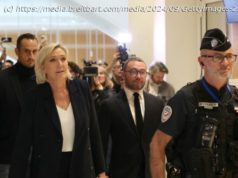The Jackson estate has fought hard to keep the two-part HBO documentary from finding an audience.
Sunday night, as HBO aired part one of its new soul-shaking documentary Leaving Neverland, the Michael Jackson estate did what it’s always done best in regards to the decades of child abuse allegations surrounding the singer: deflect and distract.
The estate dropped a last-minute documentary of its own on Jackson’s official YouTube channel, free for a limited time: a concert documentary, Live in Bucharest (The Dangerous Tour), from Jackson’s 1992 Dangerous tour — ironically, a tour that collapsed due in large part to the news about the first police investigation into the allegations. The concert film is, as Variety notes, exactly the same length as the first part of Leaving Neverland.
The Jackson estate also promised to release a second concert on YouTube on Monday night, this one of Jackson’s famed 1988 concert at Wembley Stadium in London. Like the Sunday night concert, this one will also be released at 8 pm Eastern — the same time that HBO will air the second part of its documentary.
The attempt to distract Jackson’s fans from accounts of his alleged abuse is not new. Wade Robson and James Safechuck, the two men at the heart of the documentary, have spent the past five years trying to publicize and seek justice for their stories of years of grooming, manipulation, and abuse at the hands of Michael Jackson. They have also spent much of the past five years embroiled in lawsuits with the Jackson estate.
The new documentary, produced and directed by veteran documentarian Dan Reed, is the result of prolonged efforts by Robson and Safechuck to tell their stories — but the new documentary has had to fight its own battles with Jackson’s estate.
The production is currently facing a lawsuit by the Jackson estate that is seeking $100 million in damages from HBO. But this is just the latest volley in a long fight by the estate to suppress and discredit the documentary and its allegations — and the two men at its center.
Wade Robson is a world-renowned choreographer, famed for developing routines for N’Sync, Britney Spears, So You Think You Can Dance, and many more. He got his start in the industry in 1987 — when, at the age of 5, he won a dance competition and met Jackson while Jackson was touring Robson’s native Australia.
Robson’s history as one of the many boys Jackson befriended has been well reported over the years, though it gains new resonance in the documentary when told through the perspective of an adult Robson and his mother, each looking back on the brief, deceptively fairy tale-like friendships they shared with Jackson.
After meeting them in Brisbane, Robson and his mother recount, Jackson befriended the whole family, lavishing attention on all of them and even flying them to Los Angeles when Robson was 7. From there, Robson has alleged, behind the scenes of their professional relationship, in which Robson appeared in several promotional campaigns and public appearances with Jackson, Jackson groomed Robson into a system of abuse that continued for seven years.
At one point, Robson’s mother says in the documentary, she rejected Jackson’s request to keep her son with him, alone, for an entire year; eventually, his entire family moved to LA to be closer to Jackson and promises of stardom, only to find shortly after their arrival that Robson was no longer Jackson’s favorite boy. While the alleged abuse was happening and well after it stopped, Robson says he continued to believe nothing Jackson had done to him was abusive. “I never forgot one moment of what Michael did to me,” he told the Today show in 2013, “but I was psychologically and emotionally completely unable and unwilling to understand it was sexual abuse.”
This belief, he now says, compelled him to speak up twice on Jackson’s behalf, once in 1993 at the age of 10, when he denied any abuse to authorities during the first criminal investigation of Jackson, and additionally describing his visits to Jackson’s house in the press as being simply like a “ slumber party ”; and again at age 22, when his supportive testimony during Jackson’s 2005 criminal trial for child abuse was widely viewed as significant evidence in Jackson’s favor.
Home
United States
USA — Art The Michael Jackson estate airs rare concert films to try to distract...






